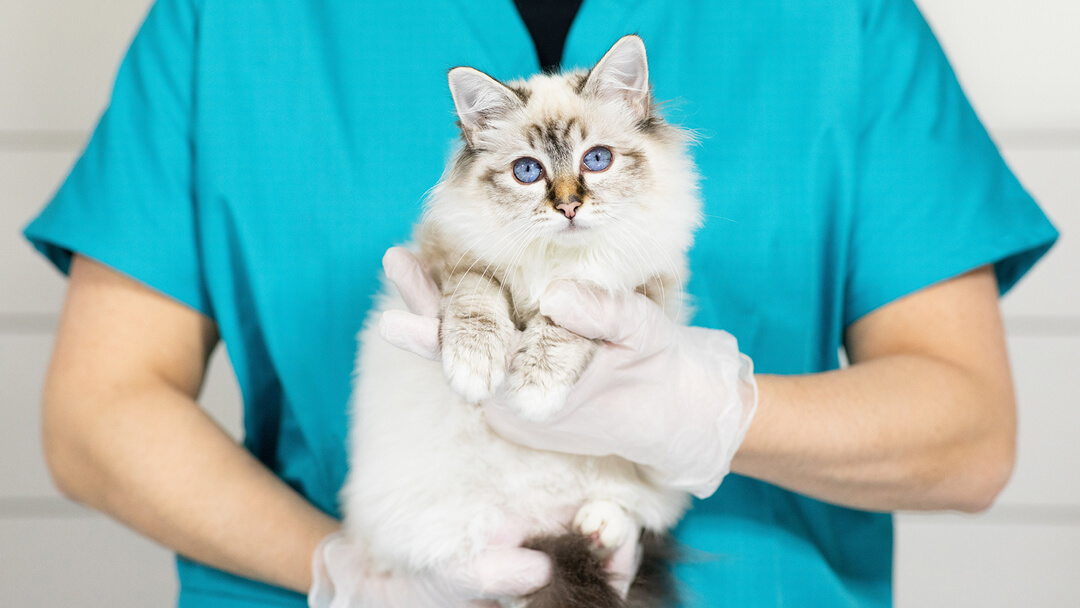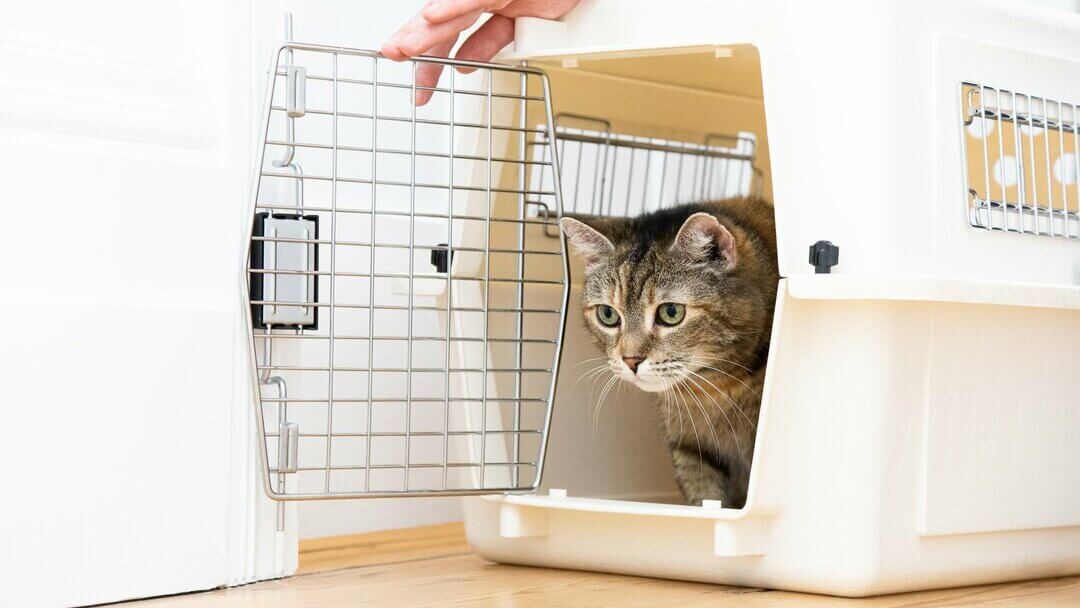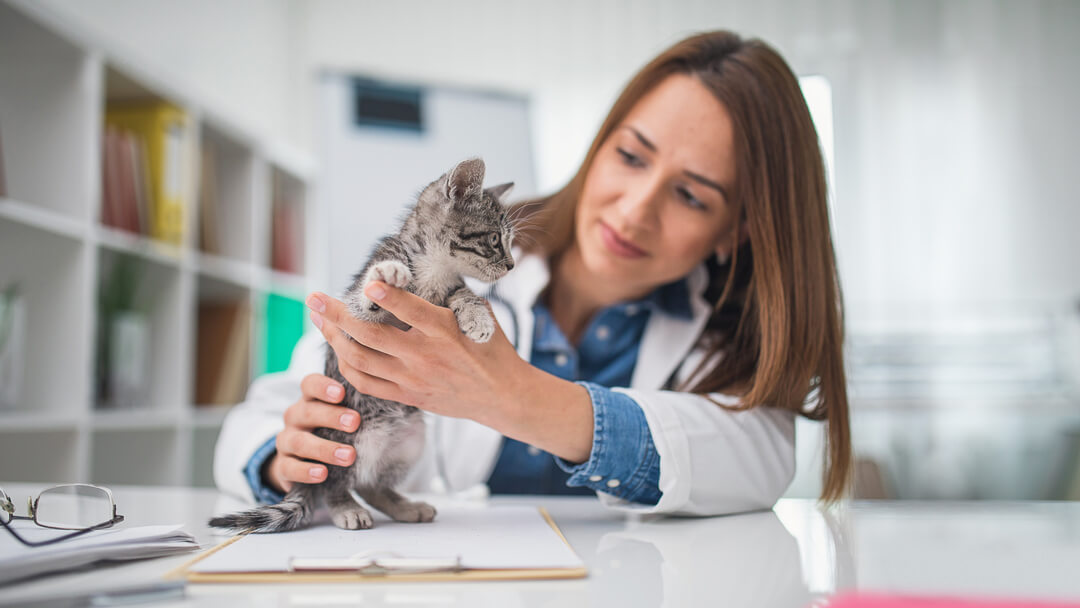

You’ve made a new furry addition to your family – fantastic! When your kitten is still so small and cute, it could be tough to imagine them with kittens of their own.
However, as your cat reaches sexual maturity between four to six months old, they could potentially have kittens whilst they are still kittens themselves! Therefore as a new pet owner, you’ll need to start thinking about cat neutering early on. Neutering felines means that your cat will avoid any unplanned pregnancies and it can also protect them from certain diseases.
"The decision to neuter your cat is one of the most important choices you will make as a pet owner. The Purina PetCare Team are here to answer any questions you have."
Spaying a cat
Neutering felines means that your cat will avoid any unplanned pregnancies and it can also protect them from certain diseases.
Neutering or spaying your cat doesn’t have to be a daunting decision. Our PetCare Team are here to tell you all you need to know about neutering, so that you can make a decision that’s best for you and your cat.
What is neutering?
Neutering is a common and routine operation that involves the removal of your cat’s sexual reproduction organs. It’s otherwise known as ‘spaying’ for female cats and ‘castration’ for males.
Female cats
For female cats, neutering involves removing their ovaries and uterus, although sometimes only their ovaries will be removed. This is usually done by a small incision on her left hand side, and can also be done underneath along her middle.
Male cats
For male cats the procedure involves the removal of their testicles. The procedure is much simpler for males, and doesn’t require any stitches.
Does neutering cats hurt them?
The neutering or spaying operation is very simple and your cat will be given an anaesthetic to ensure that they don’t feel any pain during the procedure.
After the operation, the vet will give your cat pain relief injections to help with any post-surgery discomfort. You should also be provided with anti-inflammatory medicine and painkillers to give to your cat to take at home.
As the procedure is much less invasive for male cats, they should only need medication for a day. Female cats will need medication for about three days to help them recover as quickly and painlessly as possible.
Why should I neuter my cat?
Neutering a cat has multiple benefits for your pet. For example, your cat will be less likely to contract certain diseases as well as avoid unwanted pregnancies. Other advantages of neutering or spaying a cat include:
- Curbing the naughty behaviour that comes with sexual maturity, such as spraying urine to mark their territory.
- Neutered cats are less likely to stray from home, which protects them from being involved in road traffic accidents and fighting with other cats.
- Your pet may become more affectionate. Female cats can often become gentler.
- A reduced risk of contracting certain diseases, including feline leukaemia and feline aids.
- A decreased risk of your female cat developing a womb (uterine) infection.
- If female cats are spayed at an early age, they are less likely to develop mammary (breast) cancer.
When should I neuter my cat?
We recommend neutering your kitten before they reach sexual maturity and are able to have kittens themselves. This is normally around the age of four to six months old. You will be able to tell when your cat approaches puberty, as female cats will call loudly, and male cats are likely to spray urine to mark their territory. However this is something that you should talk to your vet or breeder about to understand when they would recommend to neuter your cat.
Some rescue centres and vet practices recommend early cat neutering from 12 weeks of age, or sometimes even earlier.
To protect your cat from having or causing unwanted pregnancy, keep them inside until they have been neutered.
Myth
You may have heard that it’s good for cats to have a litter of kittens before they are spayed - but our experts at Pet Care Team confirm this isn’t actually true.
To get your cat neutered, you will need to book an appointment with your vet. You may be asked to bring your cat in for a pre-anaesthetic check-up before the actual operation.
Your vet will ask you not to feed your cat the evening prior to the anaesthetic – make water available as normal, but pick it up on the morning of their operation to stop them drinking before surgery.
Your cat will normally need to be dropped off with the vet in the morning, and you should be able to pick them up later that day.
If you want to neuter your cat and cannot afford the cost, speak to your local animal charities. Many animal charities run neutering funding scheme
All cats are bound to be a little drowsy after their operation, but they should be back to their normal, lively selves very soon. After that, the recovery process varies per gender, as the operations are different. There are a few things you can do to help your furry boy or girl heal after being neutered.
Urinary tract problems
After neutering, your pet might be more likely to develop urinary tract problems. If you notice any changes in your cat’s urinary habits such as going more often, squatting without peeing or passing blood, talk to your vet.
Weight gain
Sometimes neutering is associated with weight gain. Although the operation isn’t directly responsible for cats gaining weight, it can stop them roaming for a mate. As this means they move less, cats might put on a couple of pounds.
If you notice your pet putting on weight, you can keep them exercised by playing with them or walking them on a harness. Use our playing tips guide to inspire your playtime regime.
You can also modify their diet – one of our lighter formulas can help:
- Your female cat will come into season approximately every three weeks once she’s reached sexual maturity. During her season, she may loudly ‘call’ and be very restless, which can make home life more difficult for you.
- When your female cat is in season, you will need to be very vigilant to protect her from any amorous males in the area to prevent he becoming pregnant.
- Your cat could have as many as three litters each year, with up to six kittens in each litter. This can be very expensive.
- Your cat may be more inclined to roam away from home, increasing their risk of being involved in traffic accidents.
- As male un-neutered cats tend to be more aggressive, they are more likely to fight with other cats. This puts them at risk of injury and also spreads disease.
- Un-neutered female cats are at a higher risk of developing mammary tumours (breast cancer) at around 6-7 years old. Check your cat for any lumps in the mammary area regularly and, if you find any that cause concern, speak to your vet.
Usually cats do not display any obvious physical symptoms until they reach the second or third week of the pregnancy. If you think your cat might be pregnant, contact your vet for confirmation as soon as possible. Read our tips on spotting the signs of pregnancy to know what symptoms to look out for.
It may be possible that your cat can still be neutered whilst pregnant, which will end her pregnancy and stop her from falling pregnant again in the future. Your vet should be able to provide more information on spaying a cat when pregnant, to help you make a decision. Cat and kitten neutering depends on your personal circumstances. Before making your decision, please consider what is best for you and your cat.


















